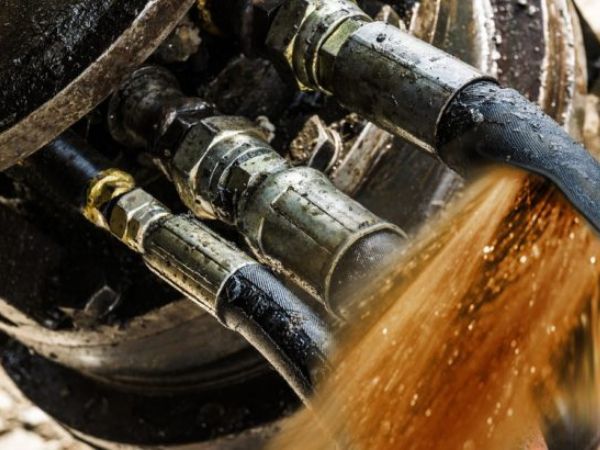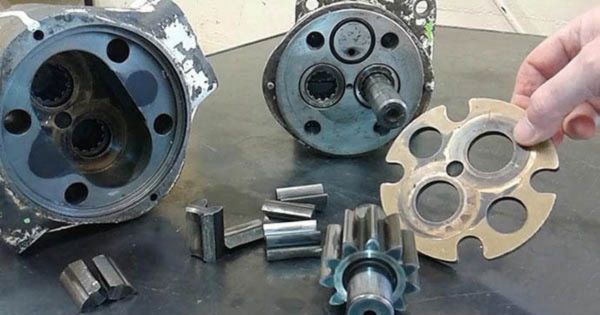What should I do if the hydraulic pump loses pressure?
Hydraulic pumps play an important role in the system, responsible for generating force and transmitting energy so that the equipment operates stably. However, there are many cases where the pump still operates but the pressure is not reached and the flow gradually weakens, causing the cylinder to not work as desired. If you encounter this situation, you need to clearly determine the cause to have appropriate treatment to avoid affecting work performance. So what is the cause and how to fix it, all will be in the article below!
Contents
The cause is that the hydraulic pump loses pressure and operates weakly
Oil leak in pump
One of the common causes of hydraulic pumps losing pressure is leaks. Oil can leak at locations such as hydraulic valves, oil pipes, joints or flanges. The main reason is that the seals and gaskets are worn and scratched, causing the joints to no longer be tight. In addition, if during the installation process, you wrap tape or rubber rubber unevenly or accidentally install the flange upside down, over time these parts will also wear out, reducing the pump's performance.

Pump surface is worn
Another reason why a hydraulic pump is weak or loses pressure is because the working surface of the pump wears out over time. Pumps such as gear pumps, leaf pumps and piston pumps are susceptible to wear and tear due to constant friction during operation.
As pump surfaces wear, the pump's ability to absorb and expel oil is reduced, resulting in poorer performance. For example, with gear pumps, if the tooth tips are worn, the mesh between the gears will become loose, reducing oil pressure and affecting the operation of the entire system. The greater the degree of wear, the more clearly the pump's performance declines.
The safety valve does not create enough pressure
Safety valves play an important role in maintaining stable pressure for the hydraulic system. If the safety valve is not adjusted properly, the pump may lose pressure.
When setting pressure, make sure the set pressure level is higher than the system's working pressure level. If the safety valve pressure is too low, the oil will continuously flow back to the tank instead of going through the system, making it impossible for the pump to create enough pressure to operate cylinders and other equipment. This is one of the common causes of hydraulic pumps operating weakly or losing pressure during operation.
Oil filter and suction pipe
The oil filter is responsible for retaining dirt and impurities in the hydraulic system, helping the oil flow cleaner and protecting internal components from damage. However, after a period of use, the filter can become dirty, reducing oil flow and affecting pump performance.
Therefore, cleaning the filter periodically is essential. If the filter is clogged, oil will not be able to flow evenly into the system, leading to a weak pump or loss of pressure. At the same time, it is also necessary to check the suction pipe ports to ensure there are no debris or obstructions affecting the flow of oil.
The system is contaminated
Another reason why hydraulic pumps are weak or lose pressure is because the system contains many impurities, dirt or small metal filings. These impurities can follow the oil flow throughout the system, causing wear on internal parts of the pump and pipes. When the pump surface is scratched or parts are worn, performance will decrease significantly.
To avoid this situation, the system should be checked and cleaned regularly. Using quality hydraulic oil, periodically changing the oil and cleaning important parts will help the pump operate stably and maintain the necessary pressure.
Hydraulic pump overloaded
After a long period of operation, the hydraulic pump may be overloaded, leading to loss of pressure or weak performance. The cause is not only due to the pump operating beyond its design capacity but also due to continuous working time and increased temperature causing metal parts to expand, have greater friction and wear faster.
When the pump is overloaded, the pump shaft will be under great pressure, leading to reduced performance, unstable pressure or even a complete pressure drop. To avoid this situation, it is necessary to ensure that the pump operates within the allowable capacity limit, check the system temperature regularly and perform periodic maintenance to prolong pump life..
Refer to some hydraulic pump models here:
Xinchang Tools QQ-700 high pressure hydraulic pump
EMEADS GE-260 electrohydraulic pump
Below are some numbers that cause damage to hydraulic pumps that we have compiled
The pump makes a very noisy noise
In addition to losing pressure or running weakly, hydraulic pumps may also experience unusually loud noises when operating. The cause often comes from pitting, aeration, incorrect joints or component wear.
In particular, pitting is caused by air bubbles forming and growing in the oil, which can be overcome by cleaning or replacing the oil filter and periodically changing the hydraulic oil. If the coupling is incorrectly installed or loose, it needs to be adjusted to avoid leakage. In case the pump is worn out, the seal can be replaced and hydraulic oil can be added according to standards to ensure stable operation of the pump.
The machine overheats during operation
Abnormally high pump temperatures can be due to many reasons such as pitting, aeration, overload or component wear. Remedies for pitting, aeration and abrasion have been mentioned above.
Particularly in cases where overload causes the pump to heat up, a pressure gauge can be used to check and adjust the operating pressure, helping the pump operate within a safe threshold and limiting overheating.
The pump operates slowly and performance is reduced
In addition to causes such as aeration, wear, pitting or component damage, hydraulic pumps can operate slowly and inefficiently due to insufficient oil level, improper oil viscosity or stuck internal parts.
To overcome this situation, you can check and add hydraulic oil when necessary, and replace new oil if the old oil's quality has decreased. If the valve or piston is stuck due to high viscosity oil or impurities, clean and maintain periodically to ensure smooth operation of the system.
Repair hydraulic pumps at home

Below are some measures to help you handle hydraulic pump pressure loss:
- Monitor and control parameters such as oil flow and pump pressure to avoid overload or operating under capacity.
- Periodically clean the hydraulic system, including pipes, oil, valves and pistons to prevent dirt and iron filings from causing blockages or component wear.
- Check the entire machine, making sure the joints are firm and have no leaks or damage. If you discover that components are heavily worn, replace them promptly.
- Adjust the safety valve to a level appropriate to the operating pressure of the system to maintain stability when the pump operates.
- Check and add hydraulic oil when necessary, use the correct type of oil that meets the standards to ensure the pump operates effectively.
Conclude:
Above are the common causes of hydraulic pumps losing pressure, weak performance and how to fix each case. Hopefully this information will help you maintain a more stable and durable hydraulic pump system.
